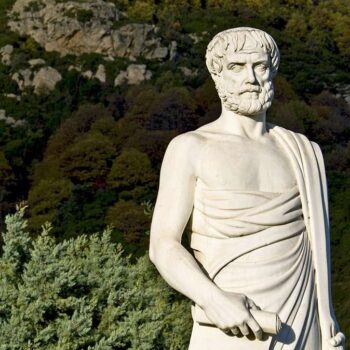“I searched for myself.” (Sweet 101; cp. DK 101, K 28)
In a quite literal sense, the self might be thought the easiest thing in the world to find. Indeed, why would you need to search for it? It’s always right there with you (or as you). How could you lose it?
The obvious point here, then, is that Heraclitus is not speaking literally. His search for the self aligns with that of many Ancient philosophers, who also did not view finding the self as easy: In fact, when asked what was difficult, Thales, the reputed first philosopher in Ancient Greece, replied “to know oneself” (LM II, p. 227) Indicating that the search for the self even had something of the character of a religious obligation in the Ancient world, the words “Know thyself” (gnothi seauton) were also famously inscribed in the forecourt of the Temple to Apollo at Delphi.
The search for the self presupposes that there is some dimension of the self below the surface. Not seldom the presumption is there is a “true self,” distinguished from the perhaps superficial or falsely understood self. At least there are hidden dimensions of the self.
But what are those dimensions? What do we find when we find the self? An understanding of the complexities of the human animal? An understanding of our individual strengths and weaknesses? A conduit to the the world that gives accounts of reality that will always be distorted? A conduit that has the possibility of achieving objectivity and truth? Is the “true self” some universal characteristic such that all true selves are the same? Is it an expression of atmen as in Hinduism, or of universal characteristics of mind a la Hegel or some expression of our “species being” a la young Marx? In Heraclitus, this is complicated by his ideas of flux.
Heraclitus famously notes that “nature loves to hide.” Certainly the search for the self exemplifies this. We are born fully dependent upon others to look after us, with no ability to speak or get around on our own. We grow and change throughout our lifetimes becoming more independent. We grow old, perhaps again becoming more dependent. Indeed, we change constantly, physicially in reference to what we eat, whether and how we exercise, mentally in reference to new experience, which provides us with new information to reflect on, new impulses for shaping our worldviews. What is the self in the midst of all this change? Assumedly against reflections like these, Cratylus, Heraclitus’ most famous follower, indicated the impermanence of all reality, including the self: In response to the Heraclitean view that one can’t step in the same river twice, he indicated that it is not possible to step in it even once, for both the self and the river are continuously changing.
And as Aristotle already acknowledged was known in ancient Greece, if there is nothing permanent in the self or the world, then the search for knowledge of any sort (obviously including self-knowledge) is futile (cp. Aristotle in the Metaphysics, 65.3; in LM III, pp 227f.).
Were we to follow in this direction yet somehow still muster up the ability to speak about “self-knowledge” at all, we might be led to a position a bit like that of Socrates, to embracing a very modest conclusion: that self-knowledge ought lead to an awareness of the limitations of one’s own knowledge. Wisdom then would consist in recognizing the limitations of the self–in an acknowledgement of how little we can know.
However, in the end Heraclitus isn’t so skeptical or so modest. All change occurs in accord with some logical and at least somewhat permanent principle(s) that can be known. Further, Heraclitus clearly views the self as linked to the rest of reality. The self opens up to the entire universe.
Many sources indicate Heraclitus is a proponent of panpsychism (see, e.g., Calcidius and Sextus Empiricus LM III, p.265). The individual soul has “a spark of the the stars’ substance” (see Macrobius, LM III, p. 255) Or the individual mind, the individual self, is linked to a larger objective or absolute mind (if we can borrow some language from Hegel without seeming to impose too much on our subject). As Heraclitus notes, “all things are one” (F 31).
Against this background, we can see the search for the self as thus opening up to a knowledge of the one reality to which the self is linked (cp. F 36). There is a certain characteristic of thinking which is common to all (cp. F 30, 31). Self-knowledge it appears will open up to knowledge of common principles and knowledge of the world. The self, for Heraclitus, is a conduit to the universe. But he is adamant that one doesn’t just turn inward, like a prophet, to learn what this one is to which we are linked. As we have seen, he thinks we get to this common world to which the self opens us through seeing, listening, through experience, through using our own reason when examining that world and hearing and examining accounts of it.
